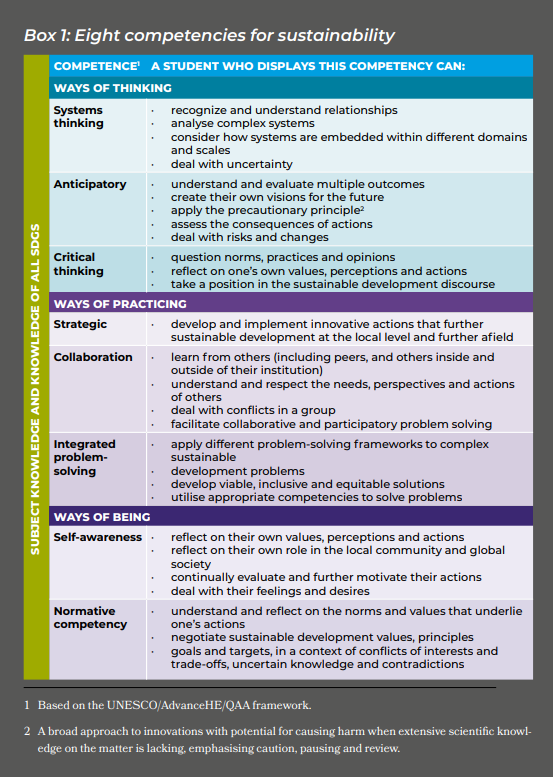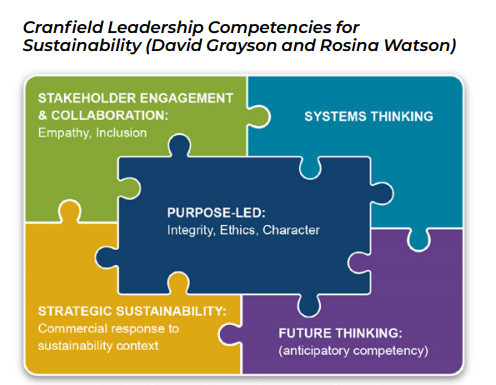Dr Rosina Watson, Head of Cranfield School of Management’s Sustainable Business Group, explores how education can help managers and leaders take their organisations in a more sustainable direction, and the key elements of sustainable business strategy that can be learned and implemented successfully.
When I embarked on a PhD at Cranfield just over a decade ago, I quickly realised I could have more impact teaching others how to take their organisation down a more sustainable path, rather than leading from within a single organisation.
Prior to my academic career I was Head of Corporate Responsibility at a major UK retailer, which was an amazing role. Finding ways to make the business more successful at the same time as reducing our negative impacts, and even creating positive value for society, was so rewarding.
There were so many opportunities to be more efficient, to waste less, to help our customers and motivate our colleagues by thinking about planet and people as well as profit. Everywhere we looked there were opportunities to reduce cost, increase efficiency and improve our reputation.
But it was also an extremely challenging role. Seeing the opportunities was one thing but making them happen was another. I had held senior leadership roles in commercial, finance and strategy before, but this one had some added dimensions:
1) It involved technical knowledge, but also softer skills such as influencing and storytelling;
2) It was much more outward looking, with more time spent talking to people outside the business, including competitors;
3) It was about challenging assumptions and the status quo, driving innovation and change;
4) Hardest of all, it involved changing the narrative around what it meant to be a good business, and how to achieve and measure that.
As a relatively new field of study, sustainability as a business practice is continuously evolving and developing. What is becoming clear, however, is that sustainability is not a single or standalone function; it is a complex subject that requires innovation and initiative, and that needs to be embedded throughout the organisation, at every level and in every department.
The case for sustainability education
In the face of global social and environmental challenges, there is increasing pressure from customers, investors, and citizens for business to be part of the solution.
The British Academy defines the purpose of business as “to profitably solve problems of people and planet, and not profit from causing problems”¹. This means that managers must now respond to the changing needs and expectations of a wider set of organisational stakeholders, in the context of a volatile, uncertain, complex and ambiguous (VUCA) environment.
Managers need to lead their organisations in ways that contribute to solving society’s challenges rather than adding to them and play their part—in their value chains, communities, industry sector and wider society—in achieving systems change.
However, most organisations tend to find it difficult to manage measures of success beyond profit. They are often not very good at looking outside their boundaries to tackle problems that are not within their direct control, or that require partnership and collaboration to solve.
“Most organisations tend to find it difficult to manage measures of success beyond profit. They are often not very good at looking outside their boundaries to tackle problems that are not within their direct control, or that require partnership and collaboration to solve.”
Many professionals do not have the skills to make this complex and unchartered journey towards more sustainable business practices. As individuals, we can find it difficult to imagine the radical changes we will have to make in the way we live, work and do business if we are to bring human activity back into balance with the wider living world.
Sustainability education literature speaks of an urgent need equip managers with the competencies required to transform management practices and lead their organisations towards a more sustainable future. This includes contributing to achieving the 2030 Sustainable Development Goals and the Paris agreement’s commitment to achieve Net Zero by 2050, as well responding to an ever-expanding set of sustainability-related regulations and reporting frameworks.
We need leaders across all functions of business who are capable of working collaboratively to address complex sustainability challenges.
Addressing these shortcomings requires education that “empowers learners to take informed decisions and responsible actions for environmental integrity, economic viability and a just society, for present and future generations, while respecting cultural diversity” (UNESCO, 2020).
Higher Education Institutions (HEIs) have a pivotal role to play in offering sustainability education that equips leaders to respond to their rapidly changing organisational contexts. This is particularly the case at postgraduate level, where many mid-career professionals return to study, full time or alongside their work.
HEIs are attempting to embed sustainability into their missions and curricula, guided by international frameworks like the Principles for Responsible Management Education (PRME) initiative, and the inclusion of sustainability criteria into accreditation frameworks (e.g. AAACSB and EQUIS).
There is certainly growing pressure for this from management students; a study by Yale Centre for Business and the Environment found that 70% of business students want more experiential learning focused on sustainability; and 65% desire more case studies highlighting sustainability issues.
Competencies for sustainability
There is some consensus now emerging around the competencies for sustainability that need to be taught.
Back in 2011 the evidence on the required competencies for sustainability was synthesised into a framework outlining the knowledge, skills, and attitudes necessary for successful task performance and problem solving with respect to real-world sustainability challenges and opportunities in businesses and management².
This framework is composed of five key competencies which must be integrated to successfully co-create knowledge and action for sustainability:
- Systems-thinking competence.
- Anticipatory competence.
- Normative competence.
- Strategic competence.
- Interpersonal competence.
More recently in 2021 further guidance setting out eight competencies for sustainability³ was based on UNESCOs key competencies, which themselves build on the seminal framework referenced above² - see Figure 1 below.

Figure 1
It is clear from the research that sustainability skills and competencies are just as much about personal agency, influencing, leadership and critique of ‘business as usual’ as they are about applicable knowledge and skills to deliver more sustainable solutions.
“It is clear from the research that sustainability skills and competencies are just as much about personal agency, influencing, leadership and critique of ‘business as usual’ as they are about applicable knowledge and skills to deliver more sustainable solutions.”
These competencies need to be taught and learnt though holistic, transformational learning approaches, because they demand relational learning and a questioning and evolution of people’s values and belief systems.
Four comparable critical capabilities have been identified⁴ which, when coupled with a sustainable mindset, underpin sustainable leaders’ success:
- Multi-level systems thinking.
- Stakeholder influence.
- Disruptive innovation.
- Long-term activation.
Teaching sustainability competencies
At Cranfield we have learned some important insights about teaching these competencies.
First, you need interdisciplinarity. Leading for sustainability requires technical skills, but also management and leadership skills. You need to know how to measure a carbon footprint, but you also need to be able to drive a programme of change to reduce it. This means breaking down the silos between climate scientists and future CEOs so they can understand each other’s language and combine their knowledge and perspectives.
For example, Cranfield’s Sustainability Business Specialist (SBS) Apprenticeship is the first ever Cranfield course to be owned and delivered by two schools (School of Management and School of Water, Energy and Environment) bringing together natural and social scientists working on sustainability research more closely than ever before.
It also means teaching people from many different business functions about sustainability, not just the sustainability/ ESG team. At Cranfield, this means embedding sustainability into other management disciplines through new modules such as Economics for Sustainability, Personal Leadership for Sustainability and Sustainable and Circular Supply Chains.
Next, you need diversity. Diversity in cognition, knowledge, expertise, and perspectives are critical to create the necessary and urgent solutions to the societal challenges we face as a global community.
As well as considering diversity within your workforce, this also means empowering people to look outside the organisation to see how others in your sector are responding to sustainability challenges, and working with competitors, suppliers and other societal actors (e.g. government, non-profits) to address systemic challenges.
Learners on our SBS Apprenticeship come from diverse disciplines (from engineering to finance), with different levels of prior education; they work in private, non-profit and government organisations, in sectors from defence to social housing. We create as much space as possible for them to learn about, and from, each other, as well as from the course team, and this is widely recognised as contributing to the development of critical competencies including systems thinking, stakeholder engagement and collaboration.
Strategic sustainability. All too often, sustainability is seen as a tick-box exercise, a cost, or a distraction from core business. To counteract that, a powerful thread throughout our sustainability teaching is conceptualising sustainability as a core element of strategic formulation and execution.
Underpinning this, is the ability to identify and implement value creating innovation. Tools such as Cranfield’s Sustainable Value Analysis tool can help managers to challenge the status quo. Exploring their collective diversity of thinking helps them to understand stakeholders’ perspectives, and to envision product and business model innovations which create environmental and/or social as well as economic benefits.
When sustainability initiatives generate value – for customers, for employees, for communities, and for the bottom line - energy and momentum can be created and strategic alignment is maximised.
“When sustainability initiatives generate value – for customers, for employees, for communities, and for the bottom line - energy and momentum can be created and strategic alignment is maximised.”
Systems thinking is increasingly recognised as a core competence for sustainability, but is notoriously hard to teach on an accelerated timescale (it usually comes from experience!). Teaching systems thinking is not just about shifting thinking to a holistic viewpoint, but about helping managers to develop their understanding of the impacts and unintended consequences of decisions, both within their value chains and beyond into a sector or global ecosystem.
There is also a need to help leaders consider much longer time horizons than is typical in business strategy cycles, to consider multiple possible future scenarios that may unfold, and the risks and opportunities they present to their organisations.
“Systems thinking is increasingly recognised as a core competence for sustainability, but is notoriously hard to teach on an accelerated timescale.”
The Sustainable Futures game is one way Cranfield engage learners in systems-thinking with a long-term perspective is through a role-playing game which takes participants on an experiential, transformational journey to 2050.
During the game, players representing established businesses interact with players representing entrepreneurs, policymakers, civil society organisations and citizens as they all react to changes in economy, technology, and society along alternative pathways towards a more sustainable future by 2050.
The ‘winners’ are judged not only by the resources they accumulate, but by whether they have achieved their purpose. Participants reflect on the world they have collectively created through their beliefs, values and actions. They are encouraged to apply this learning to strengthen their leadership in the present.
Developing sustainability competencies in your organisation
In conclusion, here are some practical suggestions we have developed at Cranfield of ways to build sustainability competencies in your leaders and your organisations, see Figure 2 below.
Strategic sustainability
Your sustainability strategy should be tightly aligned or integral to your core business strategy. You cannot expect a small group of sustainability experts to ‘look after’ sustainability while the core business continues as usual. Sustainability is not just about the technical aspects of measurement and reporting of impacts. It is about changing the narrative around what your organisation is there to do and the value it creates; being able to win over the hearts and minds of your employees, helping them see how they can contribute. Think deeply about how you integrate sustainability into governance and core activities including strategy development, procurement, and financial reporting.
“Your sustainability strategy should be tightly aligned or integral to your core business strategy.”
Stakeholder engagement
Many organisations are hiring from other industries, or even other sectors, to increase their ability to understand and work with their stakeholders, including non-profits and even same-sector competitors. Deeper engagement with customers can be achieved through co-creating ideas and products, for example, through crowdsourcing. Volunteering and secondments can provide opportunities for employees to widen their understanding of and empathy with stakeholders.
Systems thinking
Participation in cross-functional projects and in industry-sector coalitions can offer employees a wider view of your organization’s ecosystem.
Future thinking
Finding ways to bring in the voice of younger generations can provoke longer-term thinking. Some companies are building ‘shadow boards’ comprised of younger, next generation leaders who can offer this perspective. Setting longer-term company and personal targets can also help.
Purpose orientation
Activating a purpose beyond profit in your organisation can unleash the energy and creativity of your team in support of your sustainability strategy. Setting this wider purpose is a first step, but bringing it to life is the key, and this means connecting employees’ personal purpose to the wider purpose of your organisation. Some companies find B Corp accreditation useful – this involves a change to a company’s articles of association to explicitly allow directors to consider the interests of all stakeholders, not just shareholders, when making important decisions. A new ISO 37000 standard outlines how to govern for purpose.

Figure 2
References and notes
¹ The Future of the Corporation project, The British Academy, 2019
² Wiek, Withycombe and Redman
³ Advance HE/QAA published its Education for Sustainable Development Guidance
⁴ Research by the United Nations and global people advisory firm, Russell Reynolds (see DLQ36 article: Sustainable Leadership)
Note: A version of this article was originally published in Developing Leaders Quarterly, and a fully referenced version is available from editor@ dl-q.com on request.
Author
Dr Rosina Watson - Associate Professor of Sustainability at Cranfield School of Management. Rosina is Head of Cranfield School of Management’s Sustainable Business group, co-director of the Sustainability MSc and co-creator of the Sustainable Futures game (cranfield.shorthandstories.com/sustainablegame). She was formerly Head of Corporate Sustainability at Home Retail Group, which followed 15 years in finance, strategy and commercial roles. Read more about Sustainability at Cranfield School of Management in our latest Principles of Responsible Management Education (PRME) report.





